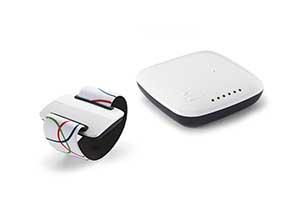
A recent study from the Netherlands has tested the effectiveness of Nightwatch, a new seizure detection device. This device is a bracelet which uses factors like heart rate and movement to recognise “major seizures”.
The researchers defined “major seizures” as seizures that were medically urgent. This included tonic-clonic, long generalised tonic and intense motor seizures. The “major seizure” definition also included clusters of myoclonic or tonic seizures.
The study was completed between 2015 and 2017. There were 28 participants, all of whom had epilepsy, a learning disability and had more than 1 sleep seizure per month. The participants resided in epilepsy centres throughout the course of the research and were monitored for 2-3 months. The researchers also filmed the participants so they could test how accurate the device was in identifying seizures.
Throughout the 1,826 nights of the study, there were 809 major seizures. The Nightwatch device sensed 85% of these major seizures. This was compared to a standard bed sensor, which only noted 21% of the seizures.
Livassured BV, The developer of the device, has said Nightwatch is much more capable of detecting seizures than other technology currently available.
The authors of this study also examined how often the device detected a seizure when there wasn’t one. 49% of the device’s alerts were real major seizures which the researchers noted as “reasonable”.
In the research paper, Dr Johan Arends and colleagues explained that uncontrolled seizures are a serious risk in sudden unexpected death in epilepsy (SUDEP). Whilst the issue of SUDEP is not fully understood at present, some researchers argue that it may have some relation to breathing or heart problems during a seizure. There is also evidence to suggest SUDEP tends to happen overnight and unwitnessed. This study has proposed that this new device may help in the prevention of SUDEP.
Some critics have argued however, that night-time monitoring systems only help people that live with others or that have carers. Numerous doctors have also made the point that the medical device field does not have the same level of regulation as the medicines field and that recommending one device over another can be difficult. They also warned that these devices are not 100% effective and may sometimes be too sensitive.
This technology has been developed by scientists from the Netherlands and has taken over 20 years. You can find more information on this study by visiting the Neurology Journal website.
